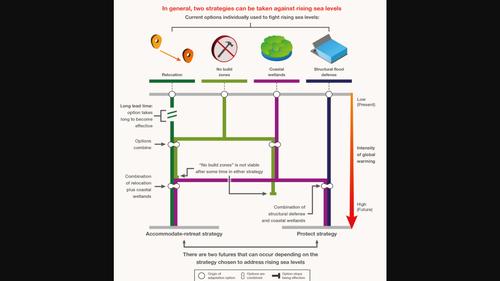Adaptation pathways for effective responses to climate change risks
引用次数: 0
Abstract
Climate related changes are already affecting every area of our world and will increasingly do so as global warming increases, resulting in compounding and cascading risks across multiple locations and sectors. Deliberative processes and anticipatory actions are required to adapt to the associated complex and uncertain systemic risks, with dynamic and long-term planning needed even where there is limited knowledge of the effectiveness of adaptation. In this focus article, we examine the adaptation pathways developed for the Europe Chapter of the IPCC AR6. We argue that illustrative pathways built on quantitative and qualitative assessment of adaptation effectiveness can inform adaptation planning to manage the increasing severity of risks. We find that as the global warming level increases adaptation pathways can diverge, leading to radically different futures, for example, adaptation responses to sea level rise. We illustrate how adaptation measures for different risks interact resulting in trade-offs, for example, increasing water scarcity. Although pathways offer a useful framework to address multiple adaptation challenges, other supporting conditions are needed for the successful implementation of adaptation, such as establishing legitimacy and buy-in through collaboration of various actors and effective governance. Ultimately, adaptation will be increasingly more complex and constrained in a warmer world, increasing risks of losses and damages to people and nature.

有效应对气候变化风险的适应途径
与气候有关的变化已经影响到我们世界的每一个地区,而且随着全球变暖的加剧,这种影响将越来越大,从而在多个地点和部门造成复合风险和连带风险。为适应相关的复杂而不确定的系统性风险,需要慎重的进程和预见性的行动,即使在对适应效果了解有限的情况下,也需要动态和长期的规划。在这篇重点文章中,我们研究了为IPCC第六次评估报告欧洲章节制定的适应路径。我们认为,建立在对适应有效性的定量和定性评估基础上的说明性路径可为适应规划提供信息,以管理日益严重的风险。我们发现,随着全球变暖程度的增加,适应路径可能会出现分化,从而导致截然不同的未来,例如对海平面上升的适应反应。我们说明了针对不同风险的适应措施如何相互作用,从而导致权衡取舍,例如日益严重的缺水问题。虽然路径为应对多种适应挑战提供了一个有用的框架,但成功实施适应还需要其他支持条件,例如通过不同参与者的合作和有效治理来建立合法性和认同感。最终,在气候变暖的世界中,适应将变得越来越复杂和受限,人类和自然遭受损失和破坏的风险也将越来越大。
本文章由计算机程序翻译,如有差异,请以英文原文为准。
求助全文
约1分钟内获得全文
求助全文

 求助内容:
求助内容: 应助结果提醒方式:
应助结果提醒方式:


